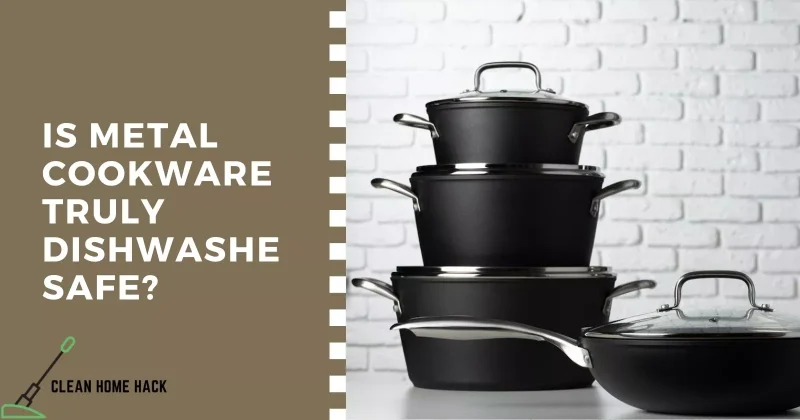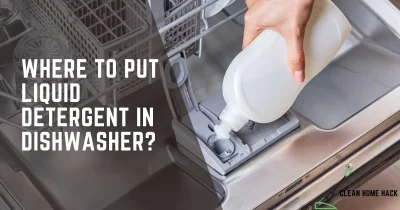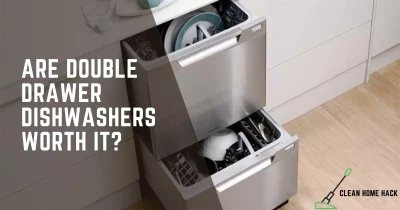Is Metal Cookware Truly Dishwasher Safe?

 The Short Answer is: The Short Answer is: |
| Yes, metal cookware can be dishwasher safe, but it depends on the type of metal and the construction of the cookware. Generally, stainless steel and multi-clad cookware are dishwasher safe. However, aluminum and non-anodized aluminum cookware should not be put in the dishwasher as they can degrade when in contact with detergents. Cast iron, steel, and tin cookware should also not be cleaned in the dishwasher as they are susceptible to rusting. Additionally, 18/0 stainless steel, which contains no nickel, may not be suitable for dishwashers as the corrosion protection is gone. It is important to check the manufacturer's instructions and labeling before putting any piece of cookware through the dishwasher. |
Cookware is an essential part of any kitchen, and with the advent of dishwashers, cleaning up after cooking has become much easier. However, not all cookware is dishwasher safe, and it can be challenging to know which ones are.
In this article, we will explore the topic: Is Metal Cookware Truly Dishwasher Safe? We will look at different types of metal cookware and their dishwasher safety, as well as some tips on how to care for your cookware.
Table of Contents
The Definition of “Dishwasher Safe”
Dishwasher safe is a term used to describe items that can be washed in a dishwasher without getting damaged. While there is no industry standard definition for what can go in the dishwasher, the general consensus is that dishes that are able to withstand high heat, wash sprays, and detergent without damage can be considered dishwasher safe.
Each kitchenware producer follows their own measures and process to determine their standard, and you can often find some variation of “dishwasher safe” printed on the bottom of dishes.
Items like wood, certain pots and pans, crystal and china, and knives can be damaged by dishwasher detergent and high heat and are not dishwasher safe. The symbol for dishwasher safe usually shows some combination of plates or glasses in dishwasher baskets.
Common Types of Metal Cookware
Metal cookware is a popular choice for many home cooks due to its durability, heating, and versatility. However, not all metal cookware is created equal when it comes to being dishwasher safe.
Here are some common types of metal cookware and their dishwasher safety:
Stainless Steel Cookware
Stainless steel cookware is a popular choice for its durability and resistance to rust and corrosion. Most stainless steel cookware is dishwasher safe, but it’s important to check the manufacturer’s instructions to be sure.
Some stainless steel cookware may have a non-stick coating that can be damaged by the high heat and harsh detergents used in dishwashers.
Aluminum Cookware
Aluminum cookware is lightweight and conducts heat well, making it a popular choice for many home cooks. However, not all aluminum cookware is dishwasher safe.
Anodized aluminum cookware is generally safe to put in the dishwasher, but non-anodized aluminum cookware can be damaged by harsh detergents and high heat.
Cast Iron Cookware
Cast iron cookware is known for its durability and ability to retain heat, making it a popular choice for many home cooks. However, cast iron cookware is not dishwasher safe.
The high heat and harsh detergents used in dishwashers can strip the seasoning from cast iron cookware, causing it to rust and lose its non-stick properties.
Copper Cookware
Copper cookware is prized for its ability to conduct heat quickly and evenly. However, copper cookware is not dishwasher safe. The high heat and harsh detergents used in dishwashers can cause the copper to tarnish and lose its shine.
While metal cookware is a popular choice for many home cooks, not all types of metal cookware are dishwasher safe. It’s important to check the manufacturer’s instructions before putting any cookware in the dishwasher to avoid damage and ensure its longevity.
Factors Influencing Dishwasher Safety
When it comes to dishwasher safety, there are several factors to consider, especially when it comes to metal cookware. Here are some factors that can influence dishwasher safety:
1. Metal Composition: Stainless steel cookware is generally dishwasher safe, but aluminum cookware is not. Aluminum can start to degrade when in contact with detergents.
2. Nickel Content: Cookware made of 18/0 stainless steel, which contains no nickel, may not be suitable for dishwashers as the corrosion protection is gone.
3. Coating: Cookware with nonstick coating should not be put in the dishwasher unless the manufacturer specifically states that it is dishwasher safe. Over time, the dishwashing process can break down the coating, causing it to flake off during cooking and ruining the nonstick finish.
4. Copper Cookware: Cookware made out of copper should also not go in the dishwasher; running them through a cycle may result in the items losing their coating when exposed to the hot water temperatures inside the machine.
5. Heat Absorption: Steel pans and ceramic dishes will absorb heat differently, which can affect the dishwasher’s ability to reach a sanitizing temperature.
It is important to always check the manufacturer’s instructions before cleaning serveware and cookware. Additionally, there are other risks such as pitting, discoloration, loss of induction compatibility, and even rust associated with using the dishwasher as these appliances are as harsh on cookware as they are.
How to Determine if Your Metal Cookware is Dishwasher Safe
Determining if your metal cookware is dishwasher safe is important to avoid damaging your pots and pans. Here are some steps to follow to determine if your metal cookware is dishwasher safe:
1. Check for a dishwasher-safe label: Most cookware comes with a label that indicates whether it is dishwasher-safe or not. Check the bottom of your cookware for a stamp that helps identify what items are dishwasher-safe.
2. Check the manufacturer’s website: If you have trouble locating a label and are unsure what material the pan is made of, check the original packaging or the manufacturer’s website.
3. Check the metal composition: Typically, 304 grade or 18/10 Stainless Steel is an alloy with a composition of 18% Chromium and 10% Nickel. These two metals create a Chromium Oxide layer on the pan, making it resistant to corrosion, especially in wet environments. While Stainless Steel itself is usually dishwasher safe, aluminum is not and will start to degrade when in contact with detergents. Additionally, 18/0 Stainless Steel, which contains no Nickel, may not be suitable for dishwashers as the corrosion protection is gone.
4. Check for exceptions: Some types of Stainless Steel Cookware cannot go in the dishwasher—this type is stainless-clad cookware. Additionally, there are other risks such as pitting.
5. When in doubt, hand wash: If you are unsure whether your cookware is dishwasher safe, it is always better to hand wash it to avoid damaging it.
By following these steps, you can determine if your metal cookware is dishwasher safe and avoid damaging it.
The Risks of Dishwashing Metal Cookware
Dishwashing metal cookware can pose several risks, including:
1. Corrosion: The excessive humidity of the dishwasher can corrode the metal. Aluminum, in particular, will start to degrade when in contact with detergents.
2. Discoloration: Aluminum pots and pans will fade and oxidize pretty quickly when exposed to the hot water and high heat of the dishwasher.
3. Loss of seasoning: Cast iron or carbon steel cookware will have those layers of seasoning stripped off and then rapidly rust in the humid environment.
4. Damage to the cookware: The dishwasher can warp or damage the rubber seal on the cover, as well as damage the valves and vents that the lid uses when cooking.
5. Loss of induction compatibility: Using the dishwasher can cause a loss of induction compatibility.
6. Rust: The dishwasher can cause rust on cookware.
To avoid these risks, it is recommended to wash metal cookware by hand instead of using the dishwasher.
Alternative Cleaning Methods for Metal Cookware
Metal cookware is an essential part of any kitchen, but cleaning it can be a hassle. Here are some alternative cleaning methods for metal cookware instead of dishwashing:
1. Use a soft cloth dampened in a solution of water and dish soap to scrub stainless steel cookware. Work parallel to the grain to avoid scratches.
2. Clean stainless steel naturally with vinegar, dish soap, baking soda, or microfiber cloths.
3. For cast-iron cookware, rinse the pan and thoroughly scrub it inside and out using dish soap and a stainless steel scrubber. For everyday cleaning, use a non-abrasive sponge such as a Dobie sponge with hot water and regular dish soap.
4. Make homemade cleaners using ingredients like vinegar, baking soda, and sudsy ammonia to clean metal surfaces.
5. Avoid soaking metal cookware with water and soap or using a dishwasher.
It is important to note that some manufacturers recommend against using vinegar on their appliance surfaces. Additionally, some cleaning methods may not be suitable for all types of metal cookware, so it is best to check the manufacturer’s instructions before trying any alternative cleaning methods.
There are several alternative cleaning methods for metal cookware instead of dishwashing. These methods include using a soft cloth with dish soap for stainless steel cookware, natural cleaning products, dish soap, and a stainless steel scrubber for cast-iron cookware, homemade cleaners, and avoiding soaking with water and soap or using a dishwasher.
Frequently Asked Questions Related to the Topic:
Can I put stainless steel cookware in the dishwasher?
Yes, you can put stainless steel cookware in the dishwasher, but there are some caveats. Stainless steel by itself can absolutely go in the dishwasher because of its non-reactive nature to dishwashing detergents.
However, some types of stainless steel cookware cannot go in the dishwasher, such as stainless clad cookware. There are also risks associated with using the dishwasher, such as pitting, discoloration, loss of induction compatibility, and even rust.
It is important to check the owner’s manual for dishwasher-safe labeling before putting any piece of cookware through the dishwasher, even if it’s made from stainless steel.
Is it safe to wash aluminum or copper cookware in the dishwasher?
It is generally not recommended to wash copper cookware in the dishwasher as it can discolor and tarnish the copper. On the other hand, it is safe to wash aluminum cookware in the dishwasher as long as it is labeled as dishwasher-safe and the right settings are applied.
However, non-anodized aluminum cookware should be hand-washed to avoid damage. It is best to wash copper pots and pans by hand with warm water and a gentle detergent.
Conclusion on Is Metal Cookware Truly Dishwasher Safe
In conclusion, metal cookware can be dishwasher safe, but it depends on the type of metal and the manufacturer’s instructions. Generally, stainless steel and multi-clad cookware can be cleaned in the dishwasher without issue.
Some metal cookware, like the Blue Diamond Pan, is oven and dishwasher-safe. However, some metals, like cast aluminum, may not be dishwasher safe and can develop mold if not cleaned properly. It is important to read the manufacturer’s instructions before putting any cookware in the dishwasher.
Additionally, hand washing is still recommended for some metal cookware to maintain its quality and durability. Ultimately, the best cookware materials are stainless steel-clad aluminum or copper and cast iron.







